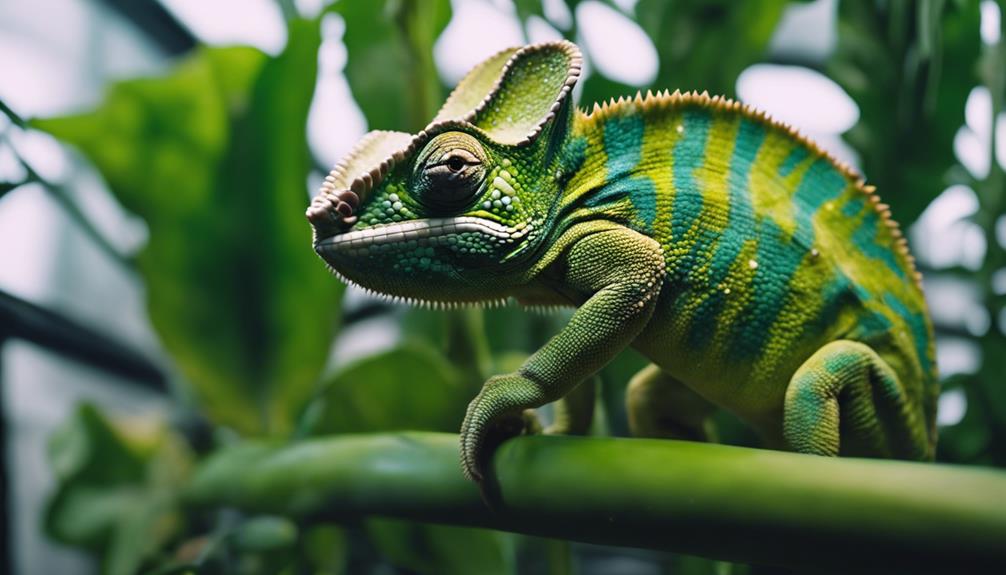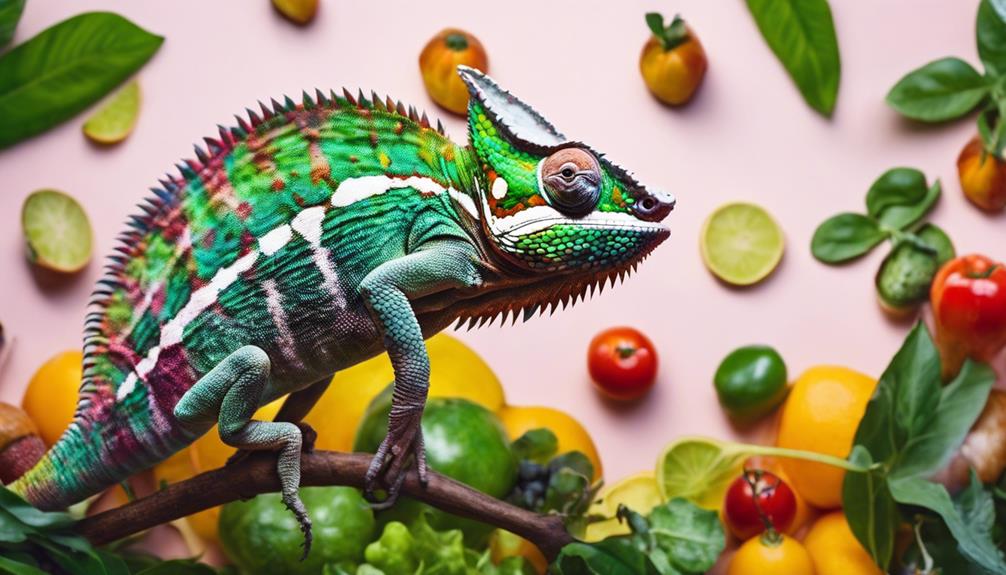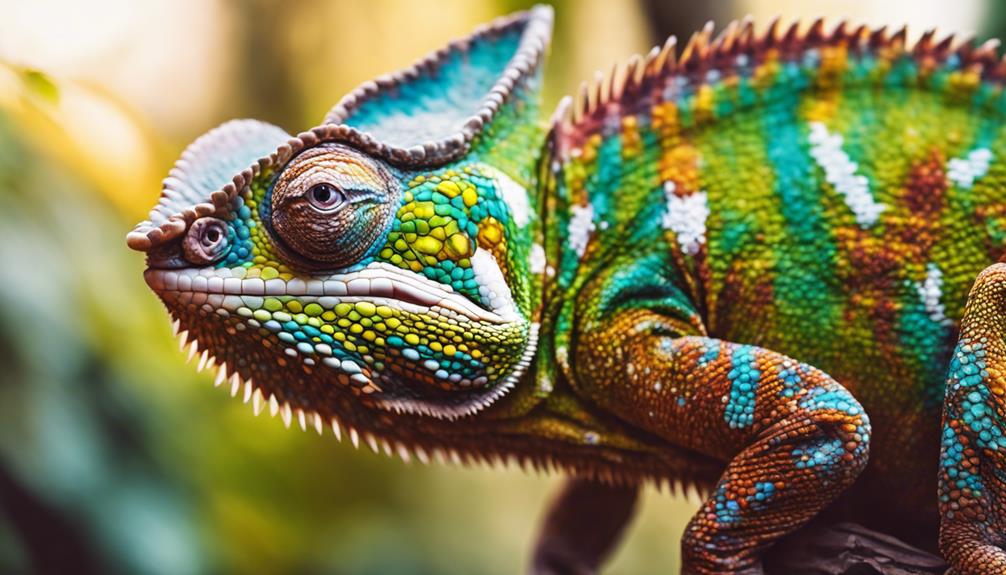Curious about the safety of Swiss cheese plants for your chameleons? While these trendy houseplants are generally regarded as safe for your scaly friends, there are some important factors to keep in mind.
From potential risks to precautionary measures, exploring the interaction between chameleons and Swiss cheese plants can provide valuable insights into creating a healthy environment for your beloved pets.
So, before you rush to add these lush greens to your chameleon's habitat, let's explore the nuances of this intriguing topic together.
Potential Risks of Swiss Cheese Plants
When considering the potential risks of Swiss Cheese plants, it's important to acknowledge the presence of oxalic acid, a compound that's mildly toxic to mammals. While Monstera Deliciosa, commonly known as Swiss Cheese plants, contain oxalic acid, chameleons have shown resilience to its effects. Chameleons would need to consume large quantities of the plant to experience any toxicity symptoms. Despite being toxic to mammals, Monstera Deliciosa is generally considered safe for chameleons to consume in moderate amounts.
Chameleon owners who've incorporated Swiss Cheese plants into their pets' enclosures haven't reported any issues related to oxalic acid toxicity. It seems that chameleons can safely enjoy these plants without adverse effects. However, it's vital to monitor their consumption and behavior closely for any signs of distress. While the risk of toxicity may be low, being cautious and observant is key to ensuring your chameleon's well-being when introducing Swiss Cheese plants into their habitat.
Benefits of Swiss Cheese Plants
Swiss Cheese plants, also known as Monstera Deliciosa, offer valuable benefits to chameleons in captivity, enhancing their habitat in various ways. Here are some key advantages of incorporating Swiss Cheese plants into your chameleon's enclosure:
- Ideal Climbing Surface: Swiss Cheese plants provide chameleons with a naturalistic climbing surface, allowing them to exhibit their arboreal behaviors and explore their environment effectively.
- Humidity Regulation: These plants assist in regulating humidity levels within the chameleon's enclosure, creating a more comfortable and suitable atmosphere for your pet.
- Hiding Spots and Temperature Regulation: Swiss Cheese plants offer hiding spots and shade, mimicking the chameleons' natural habitat. Additionally, they aid in temperature regulation, helping to maintain ideal thermal gradients essential for your chameleon's well-being.
Chameleon-Safe Plant Alternatives
To guarantee the health and safety of your chameleon, selecting chameleon-safe plant alternatives such as hibiscus, ficus, and pothos is essential for creating a suitable habitat. These plants provide a naturalistic environment for your chameleon while ensuring they aren't exposed to toxic substances.
Hibiscus plants offer vibrant flowers and are safe for chameleons to climb on and bask in. Ficus plants, including varieties like the weeping fig, are sturdy and provide ample climbing opportunities for your chameleon. Pothos, also known as devil's ivy, is another safe option that can thrive in a chameleon habitat.
Additionally, non-toxic plants like spider plants and orchids can also be included to enhance the overall habitat. Researching safe plant options and seeking guidance from a veterinarian or reptile expert can help you make informed decisions about creating a healthy and enriching environment for your chameleon.
Precautions When Introducing Swiss Cheese Plants
Exercise caution when introducing Swiss Cheese plants into your chameleon's enclosure to guarantee their well-being and safety. Here are three precautions to take into account:
- Inspect the Leaves: Before placing Swiss Cheese plants in your chameleon's habitat, examine the leaves for any signs of damage, mold, or pests. Ensuring the plant is healthy will reduce the risk of potential issues for your chameleon.
- Monitor Interaction: Keep a close eye on your chameleon after introducing Swiss Cheese plants. Watch for any changes in behavior, appetite, or physical appearance. If you notice any signs of distress, remove the plant immediately.
- Maintain a Varied Diet: While Swiss Cheese plants are generally safe for chameleons, it's crucial to offer a diverse diet to guarantee they receive all necessary nutrients. Incorporate a range of feeder insects and other safe plants to promote a balanced nutritional intake for your chameleon's overall health.
Monitoring Chameleon Interaction With Swiss Cheese Plants
When introducing Swiss Cheese plants into your chameleon's habitat, closely monitor their interaction to prevent any potential risks or harm. Chameleons may be drawn to these plants for their large leaves and climbing opportunities, increasing the chances of interaction. It's crucial to observe your chameleon's behavior around the Swiss Cheese plants, as they may explore, climb, or even attempt to ingest them. Swiss Cheese plants can be toxic to chameleons if ingested, leading to symptoms such as drooling, swelling, or difficulty breathing.
To guarantee the safety of your chameleon, keep a close eye on their activities near the Swiss Cheese plants. If you notice any attempts to eat the plant or signs of distress after interaction, promptly remove the chameleon from the area and seek veterinary assistance if necessary. Preventing accidental ingestion is key, so consider placing the plants out of reach or creating barriers to limit access.
Frequently Asked Questions
Are Swiss Cheese Plants Toxic to Chameleons?
Swiss Cheese Plants generally pose low risk to chameleons due to their minimal toxicity levels. Chameleons have not shown adverse effects from consuming these plants. While toxic to mammals, Swiss Cheese Plants are safe for chameleons.
What Plants Are Toxic to Chameleons?
When considering plants for chameleons, it's crucial to know common toxins, safe alternatives, potential dangers, and how to avoid risks. Understanding toxicity levels, symptoms of poisoning, and prevention tips helps guarantee chameleons' well-being.
Is Monstera Safe for Reptiles?
In reptile care, Monstera plants are generally safe due to their low toxicity levels. Chameleons can enjoy this leafy addition to their habitat without worry, as long as they snack in moderation. Remember, a balanced diet is key!
Is the Swiss Cheese Plant Poisonous to Pets?
When it comes to pet safety and plant toxicity, consider chameleon health. Indoor plants like Swiss Cheese Plants, though toxic to mammals, are generally safe for chameleons. Always monitor for symptoms and keep plants out of reach.
Conclusion
To summarize, while Swiss cheese plants are considered safe for chameleons, it's always important to monitor their interaction with any new plant introduced into their environment.
Despite their reputation for being chameleon-friendly, it's important to remain vigilant and observant to guarantee the well-being of your reptile companion.
Remember, even the safest plants can have unexpected consequences, so proceed with caution and always prioritize the health and safety of your chameleon above all else.


